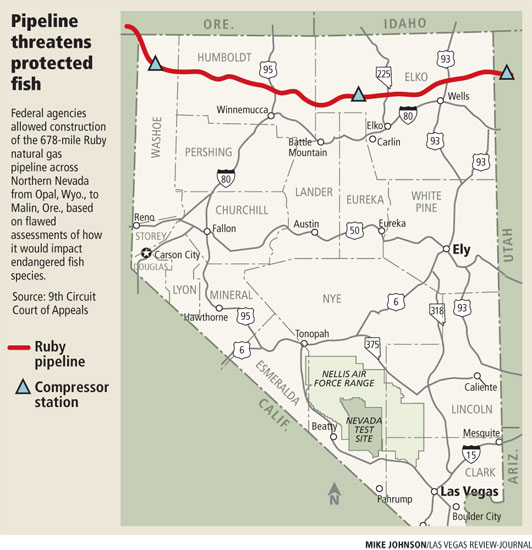Ruby natural gas pipeline may endanger protected fish species
Agencies in charge of public lands and protecting endangered species allowed the 678-mile Ruby natural gas pipeline to be built across hundreds of rivers and streams in Nevada, Oregon, Utah and Wyoming in violation of environmental laws, and now they must redo their work, a three-judge federal appeals panel ruled Monday.
The actions by the Bureau of Land Management and the U.S. Fish and Wildlife Service to allow the pipeline project to go forward without compelling mitigation measures might have jeopardized the fate of the Lahontan cutthroat trout and four other federally protected, endangered fish: the Warner sucker, Lost River sucker, shortnose sucker and Modoc sucker, according to the Center for Biological Diversity, the lead plaintiff in the appeals case.
Four endangered Colorado River fish were also affected. They are the Colorado pikeminnow, humpback chub, razorback sucker and bonytail chub.
The ruling from the 9th Circuit Court of Appeals in San Francisco in favor of a contingent of conservation groups and Indian tribes orders the Bureau of Land Management to vacate its decision that allowed Ruby Pipeline LLC to build the pipeline in 2010.
The court also directed the U.S. Fish and Wildlife Service to rewrite its biological opinion for the $3 billion pipeline project that was key to the BLM's flawed record of decision.
A spokesman for the Department of Interior said it is reviewing the ruling.
Amy Atwood, senior attorney for the Center for Biological Diversity's Endangered Species Program, said the agencies' actions violated the Endangered Species Act and the National Environmental Policy Act.
In declaring victory, the center praised the judges' ruling, saying in a statement that "these rare fish will be better protected and the public won't have to bear the whole cost of the pipeline's destructive impacts."
In a telephone interview from her office in Portland, Ore., Atwood said the judges agree with the environmental groups that the federal agencies' biological opinion and record of decision were flawed and invalid, and they must go back to the drawing board to revise them.
The groups "want enforceable and fully funded mitigation measures," not just the company's word to volunteer mitigation without being held accountable for it, Atwood said.
"We want to make sure Ruby fully funds them and make sure they clean up and revegetate the sides of the streams," she said.
The center's statement quotes Nevada conservationist Rose Strickland, saying, "The Ruby gas pipeline scarred hundreds of miles of sagebrush habitats, unnecessarily degrading and fragmenting wildlife habitats and streams.
"Weak and ineffective federal restoration and mitigation requirements must be strengthened and enforced until successfully met," Strickland said.
Since the pipeline was constructed, the company that built it has been acquired by energy giant Kinder Morgan.
Reached Monday in Houston, Kinder Morgan spokeswoman Emily Mir said, "We are reviewing the decision, and Ruby continues to transport gas and remains in operation."
The 42-inch-diameter pipeline cuts across more than 1,000 rivers and streams from Opal, Wyo., where natural gas is extracted from shale rock, to a distribution terminal in Mali, Ore. It crosses Nevada north of Interstate 80.
In the appeals court's decision, Circuit Judge Marsha S. Berzon wrote the opinion joined by Judge N. Randy Smith of the 9th Circuit and District Judge William E. Smith from the U.S. District Court for the District of Rhode Island, who was designated to serve on the panel.
Berzon wrote that the U.S. Fish and Wildlife Service's biological opinion and its statement allowing incidental take of species were "arbitrary and capricious" because the findings relied on protective measures in a conservation plan that weren't enforceable under the Endangered Species Act and would jeopardize rare fish.
In addition, the biological opinion was flawed because it didn't take into account effects from withdrawing nearly 338 million gallons of groundwater from 64 construction wells along the pipeline. Federal biologists also miscalculated the number of fish that would be killed and put no limit on the number of eggs and fry of Lahontan cutthroats that would be lost when the pipeline was built.
The judges ordered the Fish and Wildlife Service to issue a revised biological opinion that addresses effects on the protected fish species.
Other plaintiffs included the Summit Lake Paiute Tribe of Nevada; the Fort Bidwell, Calif., American Indian community, Defenders of Wildlife, Great Basin Resource Watch and the Sierra Club's Toiyabe Chapter.
Contact reporter Keith Rogers at krogers@reviewjournal.com or 702-383-0308.


















